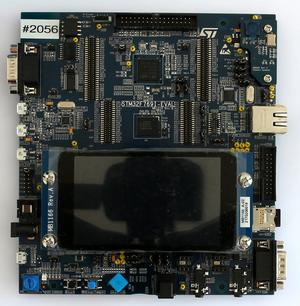Difference between revisions of "Tracing on ST STM32F769"
(→Streaming trace) |
|||
| Line 6: | Line 6: | ||
= Minimum requirements = |
= Minimum requirements = |
||
In order to use trace on the ST STM32F769 MCU devices, the following minimum requirements have to be met: |
In order to use trace on the ST STM32F769 MCU devices, the following minimum requirements have to be met: |
||
| − | * J-Link software version V6. |
+ | * J-Link software version V6.18c or later |
| − | * Ozone V2. |
+ | * Ozone V2.46a or later (if streaming trace and / or the sample project from below shall be used) |
* J-Trace PRO for Cortex-M HW version V1.0 or later |
* J-Trace PRO for Cortex-M HW version V1.0 or later |
||
* Tracepin connection like on the STM32F769I-Evalboard (See Specifics/Limitations for more information) |
* Tracepin connection like on the STM32F769I-Evalboard (See Specifics/Limitations for more information) |
||
| Line 15: | Line 15: | ||
The following sample project is designed to be used with J-Trace PRO and Ozone to demonstrate streaming trace. The project has been tested with the minimum requirements mentioned above and a ''ST STM32F769I-EVALBOARD''. The sample project comes with a pre-configured project file for Ozone that runs out-of-the box. In order to rebuild the sample project, [https://www.segger.com/embedded-studio.html SEGGER Embedded Studio] can be used. |
The following sample project is designed to be used with J-Trace PRO and Ozone to demonstrate streaming trace. The project has been tested with the minimum requirements mentioned above and a ''ST STM32F769I-EVALBOARD''. The sample project comes with a pre-configured project file for Ozone that runs out-of-the box. In order to rebuild the sample project, [https://www.segger.com/embedded-studio.html SEGGER Embedded Studio] can be used. |
||
| + | The maximum supported trace clock speed on the tested evalboard is 50 MHz due to hardware limitations (see ST manual for more information). |
||
| − | [[Media:ST_STM32F769I-EVAL_16MHz_Traceexample.zip | ST_STM32F769I-EVAL_16MHz_Traceexample.zip]] |
||
| − | |||
| − | The maximum supported traceclock speed on the tested evalboard is 50 MHz due to hardware limitations. |
||
Theoretically full 108 MHz traceclock should be possible if the hardware is setup accordingly. |
Theoretically full 108 MHz traceclock should be possible if the hardware is setup accordingly. |
||
| − | Here an example with 50 MHz traceclock: [[Media: |
+ | Here an example with 50 MHz traceclock: [[Media:ST_STM32F769_EVAL_50MHz_TraceExample.zip | ST_STM32F769_EVAL_50MHz_TraceExample.zip]] |
| − | Here is one with 108 MHz traceclock: [[Media: |
+ | Here is one with 108 MHz traceclock: [[Media:ST_STM32F769_EVAL_108MHz_TraceExample.zip | ST_STM32F769_EVAL_108MHz_TraceExample.zip]] |
To use the 108 MHz example make sure that no peripherals are connected to the trace lines. If you are using the ST STM32F769I-EVALBOARD check the manual for the needed modifications to enable higher trace speed. |
To use the 108 MHz example make sure that no peripherals are connected to the trace lines. If you are using the ST STM32F769I-EVALBOARD check the manual for the needed modifications to enable higher trace speed. |
||
| + | |||
| + | |||
| + | '''Note:''' The example is shipped with a compiled .JLinkScriptfile, should you need the original source it can be requested at [mailto:support@segger.com support@segger.com] |
||
= Specifics/Limitations = |
= Specifics/Limitations = |
||
Revision as of 09:43, 14 September 2017
Contents
This article describes how to get started with trace on the ST STM32F769 MCU. This article assumes that there is already a basic knowledge about trace in general (what is trace, what different implementations of trace are there, etc.). If this is not the case, we recommend to read Trace chapter in the J-Link User Manual (UM08001). The ST STM32F769 MCU implements tracing via pins , so a J-Trace can be used for tracing.
Minimum requirements
In order to use trace on the ST STM32F769 MCU devices, the following minimum requirements have to be met:
- J-Link software version V6.18c or later
- Ozone V2.46a or later (if streaming trace and / or the sample project from below shall be used)
- J-Trace PRO for Cortex-M HW version V1.0 or later
- Tracepin connection like on the STM32F769I-Evalboard (See Specifics/Limitations for more information)
Sample project
Streaming trace
The following sample project is designed to be used with J-Trace PRO and Ozone to demonstrate streaming trace. The project has been tested with the minimum requirements mentioned above and a ST STM32F769I-EVALBOARD. The sample project comes with a pre-configured project file for Ozone that runs out-of-the box. In order to rebuild the sample project, SEGGER Embedded Studio can be used.
The maximum supported trace clock speed on the tested evalboard is 50 MHz due to hardware limitations (see ST manual for more information). Theoretically full 108 MHz traceclock should be possible if the hardware is setup accordingly.
Here an example with 50 MHz traceclock: ST_STM32F769_EVAL_50MHz_TraceExample.zip
Here is one with 108 MHz traceclock: ST_STM32F769_EVAL_108MHz_TraceExample.zip
To use the 108 MHz example make sure that no peripherals are connected to the trace lines. If you are using the ST STM32F769I-EVALBOARD check the manual for the needed modifications to enable higher trace speed.
Note: The example is shipped with a compiled .JLinkScriptfile, should you need the original source it can be requested at support@segger.com
Specifics/Limitations
The STM32F7xx Productfamily has additional pins that can be used for tracing. Usually only 5 Pins are mapped to have the trace functionality. In this case however multiple pinout configurations are possible over different ports even. Should you be using our trace example make sure your physical tracepin connections are equal to the ones on the ST STM32F769I-EVALBOARD. If not adjust the pin initialization accordingly.
